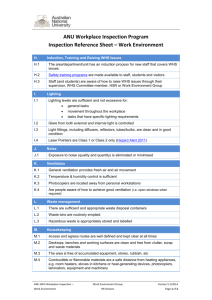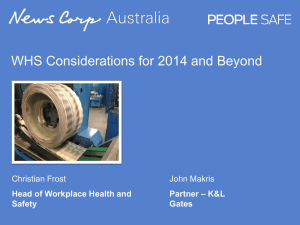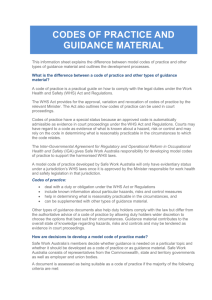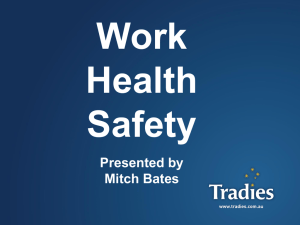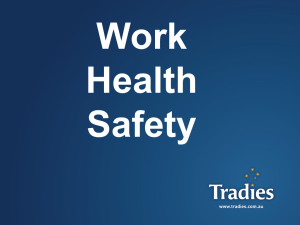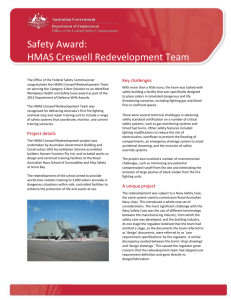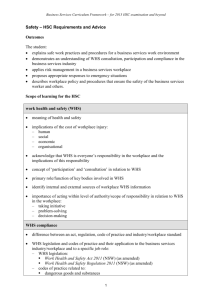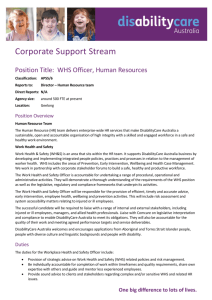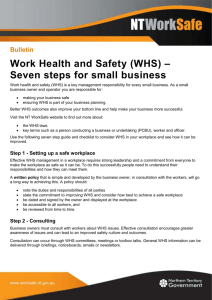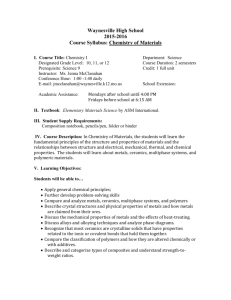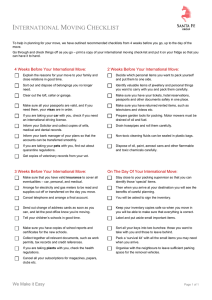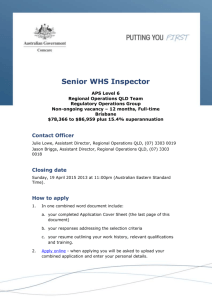Work and Life Balance - (DOCX 157KB)
advertisement
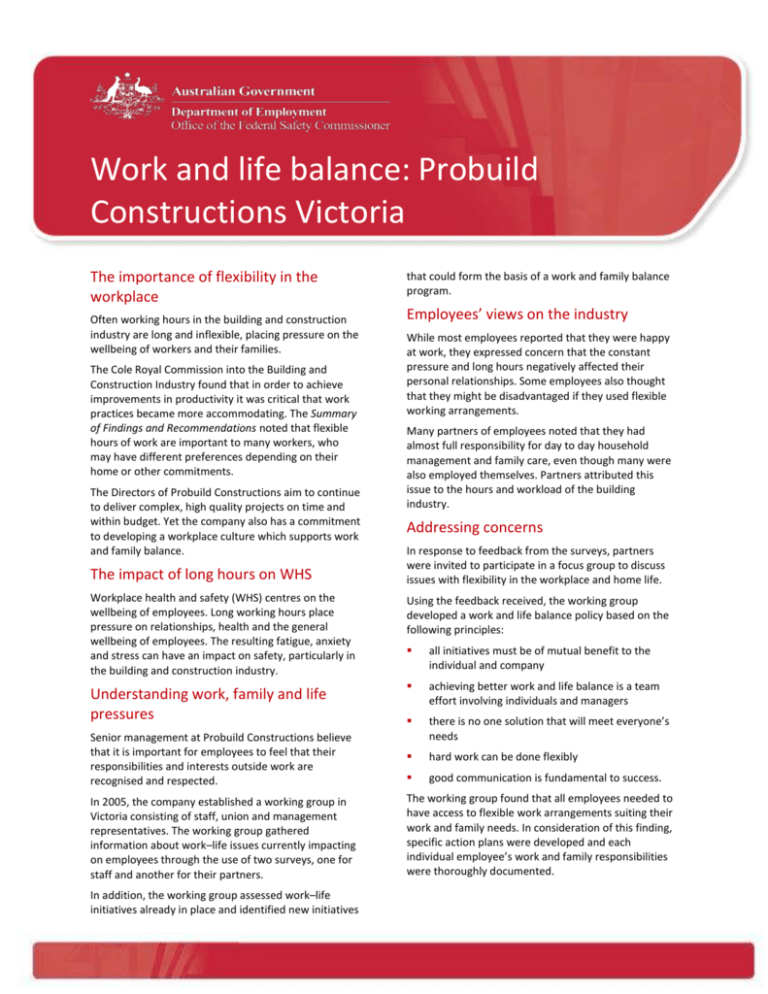
Work and life balance: Probuild Constructions Victoria The importance of flexibility in the workplace Often working hours in the building and construction industry are long and inflexible, placing pressure on the wellbeing of workers and their families. The Cole Royal Commission into the Building and Construction Industry found that in order to achieve improvements in productivity it was critical that work practices became more accommodating. The Summary of Findings and Recommendations noted that flexible hours of work are important to many workers, who may have different preferences depending on their home or other commitments. The Directors of Probuild Constructions aim to continue to deliver complex, high quality projects on time and within budget. Yet the company also has a commitment to developing a workplace culture which supports work and family balance. The impact of long hours on WHS Workplace health and safety (WHS) centres on the wellbeing of employees. Long working hours place pressure on relationships, health and the general wellbeing of employees. The resulting fatigue, anxiety and stress can have an impact on safety, particularly in the building and construction industry. Understanding work, family and life pressures that could form the basis of a work and family balance program. Employees’ views on the industry While most employees reported that they were happy at work, they expressed concern that the constant pressure and long hours negatively affected their personal relationships. Some employees also thought that they might be disadvantaged if they used flexible working arrangements. Many partners of employees noted that they had almost full responsibility for day to day household management and family care, even though many were also employed themselves. Partners attributed this issue to the hours and workload of the building industry. Addressing concerns In response to feedback from the surveys, partners were invited to participate in a focus group to discuss issues with flexibility in the workplace and home life. Using the feedback received, the working group developed a work and life balance policy based on the following principles: all initiatives must be of mutual benefit to the individual and company achieving better work and life balance is a team effort involving individuals and managers Senior management at Probuild Constructions believe that it is important for employees to feel that their responsibilities and interests outside work are recognised and respected. there is no one solution that will meet everyone’s needs hard work can be done flexibly good communication is fundamental to success. In 2005, the company established a working group in Victoria consisting of staff, union and management representatives. The working group gathered information about work–life issues currently impacting on employees through the use of two surveys, one for staff and another for their partners. The working group found that all employees needed to have access to flexible work arrangements suiting their work and family needs. In consideration of this finding, specific action plans were developed and each individual employee’s work and family responsibilities were thoroughly documented. In addition, the working group assessed work–life initiatives already in place and identified new initiatives Information pack Results An information pack was created to assist in developing a better work and family culture. The pack consists of a number of booklets and fact sheets that provide practical information on creating a better work–life balance. Probuild Constructions will track the progress of the Work and Life Balance Program. Findings will be used to measure whether employees’ work and life balance has positively changed, while also indicating the company’s success in meeting business objectives. The information pack provides an overview of the work and life balance policy, detailing why the program had been created and what it hoped to achieve. There is clear guidance on the expectations of senior management in relation to working on Saturdays and excessive hours in general. All employees and partners were provided with an information pack at the launch of the program. For further information about the Work and Life Balance Program contact: Human Resources Manager Ph : 03 9693 8222 email: info@probuild.com.au Implications for employees The pack clearly outlines the responsibilities in relation to work–life balance for all levels of employees in the company, including senior management. However, and perhaps most importantly, the booklet provides clear steps for employees on how to create a work–life balance to cater for their own personal needs. A number of brochures developed by organisations, such as Mensline Australia and WIRE—Women’s Information, are included in the pack. These groups offer support, information and general counselling services. Senior management commitment Senior management has agreed to: monitor the implementation of individual action plans counsel all senior managers in relation to the program develop a consistent approach across sites and head office that recognises the needs of employees adjust individual position descriptions and performance review processes to ensure consistency with the program commit to a self-appraisal process that ensures continual monitoring of the program at all levels. About these case studies The Australian Government is committed to improving the WHS standards for all workers on building and construction projects. These case studies have been developed to share practical ideas that can be adopted by industry to assist in their own management of WHS issues. The Federal Safety Commissioner consults widely with industry, WHS authorities and other relevant agencies to promote a cooperative approach to improving WHS performance. The vision of the Federal Safety Commissioner is a building and construction industry where no one is harmed. For further information you can: visit the FSC website at fsc.gov.au contact the FSC Assist Line on 1800 652 500 contact the OFSC via email at ofsc@employment.gov.au The Office of the Federal Safety Commissioner has prepared this case study to promote workplace health and safety (WHS) in the industry. When developing OHS initiatives, businesses and individuals should consider the circumstances and requirements particular to them and seek professional advice where required. While the Commonwealth has exercised reasonable care in providing useful information, the Commonwealth makes no representations, express or implied, as to the accuracy of the information contained in this case study. The Commonwealth accepts no liability for any use of the information contained in this case study or any reliance placed on it. This case study may list persons, organisations, products or services or may incorporate material sourced from third parties. Such lists or material are assembled in good faith. However, any such list or material does not necessarily constitute any form of endorsement by the Commonwealth of that person, organisation, product, service, or third party. The Commonwealth does not accept any responsibility for such list or material.
